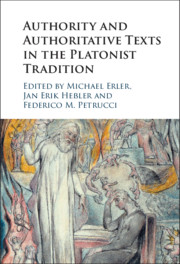Book contents
- Authority and Authoritative Texts in the Platonist Tradition
- Authority and Authoritative Texts in the Platonist Tradition
- Copyright page
- Contents
- Figures
- Contributors
- Acknowledgements
- Abbreviations
- Introduction
- Chapter 1 Xenocrates’ Invention of Platonism
- Chapter 2 An Iconography of Xenocrates’ Platonism
- Chapter 3 Arcesilaus’ Appeal to Heraclitus as a Philosophical Authority for His Sceptical Stance
- Chapter 4 Authority beyond Doctrines in the First Century bc
- Chapter 5 Authority and Doctrine in the Pseudo-Pythagorean Writings
- Chapter 6 Constructing Authority
- Chapter 7 Plutarch’s E at Delphi
- Chapter 8 Aristotle’s Physics as an Authoritative Work in Early Neoplatonism
- Chapter 9 Conflicting Authorities? Hermias and Simplicius on the Self-Moving Soul
- Chapter 10 Kathēgemōn: The Importance of the Personal Teacher in Proclus and Later Neoplatonism
- Chapter 11 ‘In Plato we can see the bad characters being changed by the good and instructed and purified.’
- References
- Index Locorum1
- General Index
Chapter 2 - An Iconography of Xenocrates’ Platonism
Published online by Cambridge University Press: 19 February 2021
- Authority and Authoritative Texts in the Platonist Tradition
- Authority and Authoritative Texts in the Platonist Tradition
- Copyright page
- Contents
- Figures
- Contributors
- Acknowledgements
- Abbreviations
- Introduction
- Chapter 1 Xenocrates’ Invention of Platonism
- Chapter 2 An Iconography of Xenocrates’ Platonism
- Chapter 3 Arcesilaus’ Appeal to Heraclitus as a Philosophical Authority for His Sceptical Stance
- Chapter 4 Authority beyond Doctrines in the First Century bc
- Chapter 5 Authority and Doctrine in the Pseudo-Pythagorean Writings
- Chapter 6 Constructing Authority
- Chapter 7 Plutarch’s E at Delphi
- Chapter 8 Aristotle’s Physics as an Authoritative Work in Early Neoplatonism
- Chapter 9 Conflicting Authorities? Hermias and Simplicius on the Self-Moving Soul
- Chapter 10 Kathēgemōn: The Importance of the Personal Teacher in Proclus and Later Neoplatonism
- Chapter 11 ‘In Plato we can see the bad characters being changed by the good and instructed and purified.’
- References
- Index Locorum1
- General Index
Summary
In the preceding chapter I traced the basis on which Xenocrates, Plato’s second successor as head of the Academy, created the original textual canon for building a Platonic system. It emerged that his authoritative Platonic texts were two myths – the creation myth of the Timaeus, and the Phaedrus’ mythical travelogue about the destiny of eternal souls. The latter passage, I argued, was so canonical as to determine, on occasion, how even the former should be interpreted.
Information
- Type
- Chapter
- Information
- Publisher: Cambridge University PressPrint publication year: 2021
Accessibility standard: Unknown
Why this information is here
This section outlines the accessibility features of this content - including support for screen readers, full keyboard navigation and high-contrast display options. This may not be relevant for you.Accessibility Information
- 1
- Cited by
